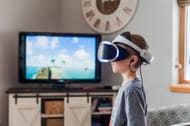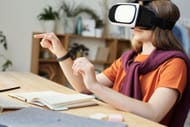Augmented Reality applications are changing and revolutionizing the world we live in. AR has emerged as a cutting-edge technology that blends real and virtual worlds, providing users with enhanced and immersive experiences. By overlaying digital elements onto the physical environment, AR applications have found their way into various industries, transforming the way we interact with technology.
This article lists seven impressive uses of Augmented Reality. From gaming and entertainment to education, retail, healthcare, architecture, manufacturing, and tourism, Augmented Reality has made significant strides in enhancing user experiences and streamlining processes.
Note: This list is subjective and solely reflects the opinions of the writer
How Augmented Reality applications are revolutionizing the world
1) Augmented Reality in gaming and entertainment

The gaming and entertainment industry has embraced Augmented Reality to create immersive experiences for users. AR games such as Pokemon GO and Harry Potter: Wizards Unite have captured the attention of millions worldwide.
By integrating virtual elements into the real world, these games allow players to explore their surroundings while engaging in exciting gameplay.
Furthermore, AR is being utilized in live events and concerts to provide interactive experiences, projecting virtual stages, effects, and animations for an unforgettable entertainment spectacle.
2) Augmented Reality in education

Augmented Reality has immense potential to revolutionize education by making learning more interactive and engaging. AR applications allow students to visualize complex concepts and subjects through 3D models and interactive simulations.
For example, anatomy students can explore virtual human bodies and understand the intricacies of organs and systems. Similarly, history students can virtually visit ancient civilizations and experience historical events. By integrating AR into classrooms, educators can foster creativity, critical thinking, and active participation among students.
3) Augmented Reality in retail and e-commerce

AR has proven to be a game-changer in the retail and e-commerce industry. By enabling virtual try-on experiences, customers can visualize products before making a purchase decision.
Whether it's trying on virtual clothing or placing virtual furniture in their homes, AR enhances the shopping experience and reduces the chances of buyer's remorse. Furthermore, AR-powered apps can guide customers through stores, provide personalized recommendations, and even offer virtual storefronts, eliminating the need for physical retail spaces.
4) Augmented Reality in healthcare

The healthcare industry is leveraging Augmented Reality to improve patient care, training, and surgical procedures. AR applications enable medical professionals to visualize patient data, overlaying vital signs and medical records onto the patient's body during examinations.
Surgeons can use AR to navigate complex anatomical structures, enhancing precision and reducing risks during surgeries. Additionally, AR is utilized in medical training to simulate realistic scenarios and provide hands-on experience without endangering patients.
5) Augmented Reality in architecture and design

Architects and designers are increasingly using Augmented Reality to visualize and present their projects. AR applications allow them to overlay virtual architectural models onto real-world environments, enabling clients to explore and interact with designs before construction.
This technology facilitates better communication between stakeholders and helps in making informed decisions regarding building layouts, materials, and aesthetics. AR also enables architects to identify potential design flaws and make necessary modifications early in the process, saving time and resources.
6) Augmented Reality in manufacturing and maintenance

AR is transforming manufacturing and maintenance processes by providing real-time information and guidance to workers. By wearing AR-enabled devices, workers can receive step-by-step instructions, visualize assembly processes, and detect errors quickly.
This improves efficiency, reduces human errors, and enhances worker safety. AR can also assist in equipment maintenance by overlaying virtual instructions onto machinery, helping technicians identify faulty components and perform repairs effectively.
7) Augmented Reality in tourism and travel

Tourism and travel industries are embracing Augmented Reality to enhance the overall travel experience. AR applications can provide real-time information about landmarks, historical sites, and attractions, enriching tourists' knowledge and understanding.
Moreover, AR-powered navigation systems guide tourists through unfamiliar cities, highlighting points of interest and providing directions. Augmented Reality also offers immersive audio-visual experiences, allowing travelers to relive historical events or explore ancient ruins virtually, even if they are thousands of miles away.
Augmented Reality applications have revolutionized various industries, offering innovative and immersive experiences. As technology continues to advance, we can expect even more impressive and practical applications of AR in the future.
With the ability to blend the real and virtual worlds seamlessly, Augmented reality applications open up endless possibilities for businesses, individuals, and society as a whole. Whether it's enhancing customer experiences, improving learning outcomes, or streamlining complex processes, AR has proven its value across multiple domains.
As more organizations recognize the potential of Augmented reality applications, we can anticipate further advancements and groundbreaking uses that will shape the way we live, work, and play.
